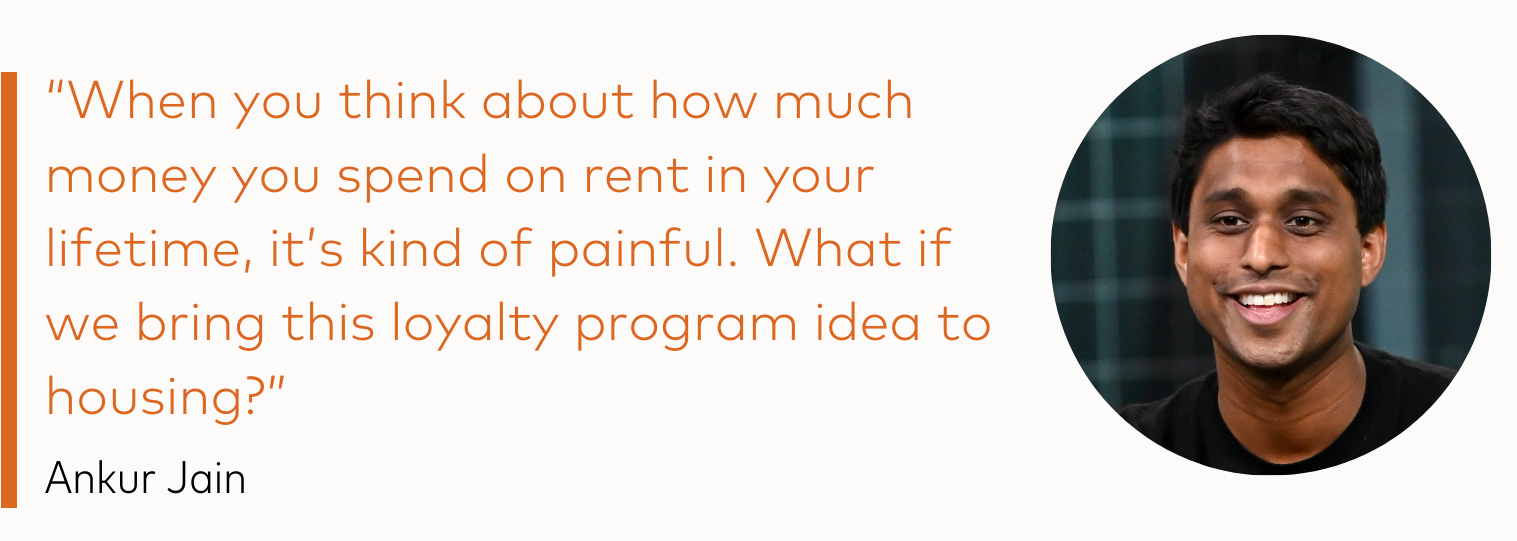How to make paying rent more rewarding
August 30, 2021 | By Deborah Lynn Blumberg
In New York City, one of the most expensive housing rental markets in the country, the pandemic saw inventories rise, prices drop and incentives like free rent on offer. But there’s one perk that venture capitalist Ankur Jain still wants to see on the table for renters: a key to homeownership.
He knows that many millennials like himself earn a good living in big cities, but the thousands of dollars they spend each month on rent don’t help them build their credit or even earn points or cash back like using a credit card would.
“When you think about how much money you spend on rent in your lifetime, it’s kind of painful,” he says. “I thought: What if we bring this loyalty program idea to housing and then use it as a way to give Americans a path to homeownership?”
Millennials are the largest generation but far less likely than Gen Xers and baby boomers to own their homes. Among the many factors that play into this trend: Millions of millennials prefer to live in cities where housing supply is limited and rent is higher, making it harder to save for a down payment.
Jain’s ideas about bringing loyalty to housing led him to found Bilt Rewards, a company that helps people pay for their rent digitally and earn rewards from it. Bilt Rewards is available at more than 2 million rental units across the country and allows users to redeem points for travel across more than 100 airlines and hotels, in addition to group fitness classes, a limited-edition collection of home décor, rent itself, and a future mortgage when financing is originated through Bilt.
Customers can pay their rent with the Bilt Mastercard, which has no annual fee and no transaction fees assessed to the renter or property owner.
Removing those fees gives landlords the freedom to accept digital payments without cutting into their profits — a major reason landlords have traditionally preferred cash or checks. They could also track payments more easily and get funds faster. “Even the most old-school landlords have come on board,” Jain says.
When renters use the card to pay rent on time, they build up their credit histories. Bilt reports timely payments to the major credit bureaus, boosting renters’ credit ratings and moving them closer to homeownership. Bilt users can improve their borrowing rates and bolster mortgage qualification in just one year through automatic credit reporting, Jain says.
Renters whose landlords aren’t part of the Bilt Rewards network can use the Bilt Mastercard to pay their rent. Bilt then sends a check to the landlord, and the renter still benefits from credit card rewards.

In the early days, Jain focused on amassing an alliance of the country’s top real estate owners. Currently, the Bilt alliance includes more than 2 million apartments across the U.S., and landlords are using the rewards program to attract new renters. Momentum picked up during COVID, as property owners began to rethink the renter ecosystem and explore “how to fill vacancies and keep residents in buildings,” Jain says. By year’s end, the company expects to add tens of thousands more buildings.
The Bilt Mastercard enables cardholders to earn points on non-rent purchases, with rent payments earning double the points.
“We wanted to have the most valuable points program in the market,” says Jain, who teamed up with Mastercard to create the Bilt Rewards program. The loyalty platform from Session M, a Mastercard company, delivers personalized offers in real time. With BiltProtect — a proprietary feature from Mastercard’s Transactis, which simplifies billing and payment processing — cardholders can make rent payments without impacting their credit lines.
To help create Bilt, Jain drew on decades of experience working in technology. At age 12, he started his first company, a web-to-mobile messaging system. Later, he built a business incubator while earning his bachelor’s degree at the Wharton School of the University of Pennsylvania. Jain has picked up lessons throughout his professional career, such as learning the value of a simple, user-friendly app from his time at Tinder.
For Jain, all those experiences boiled down to a single mission for Bilt: Making life simpler and more affordable. “The basic things in life are getting more expensive every day, and you’re getting less,” he says. “That’s been at the core of all of our product innovation.”